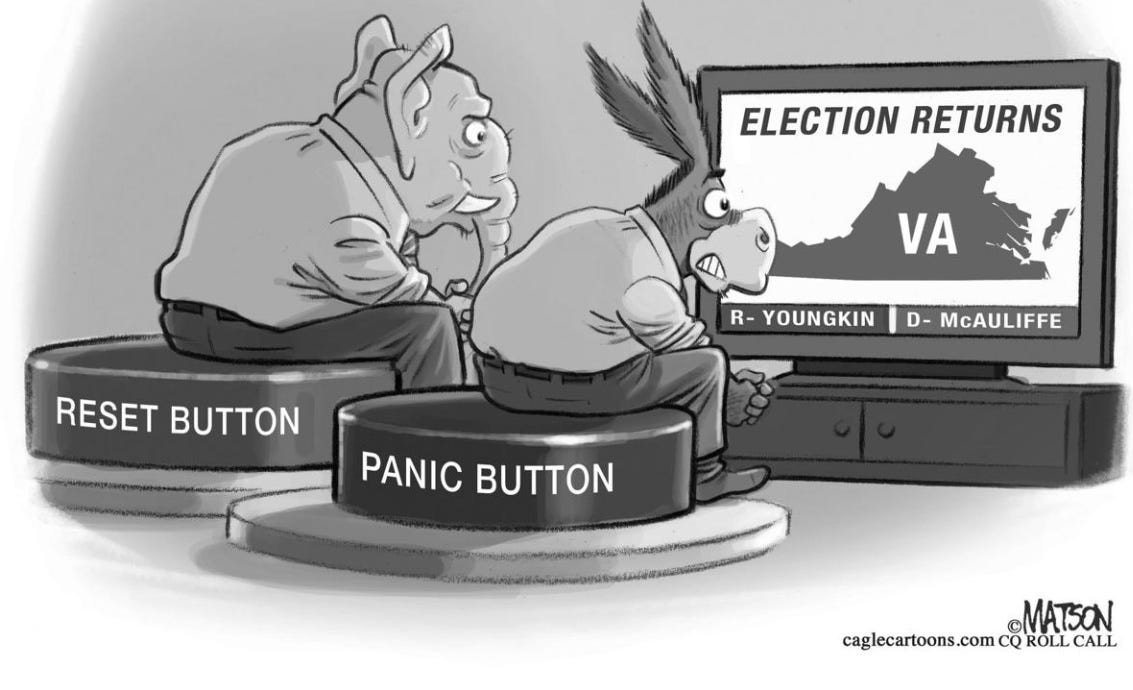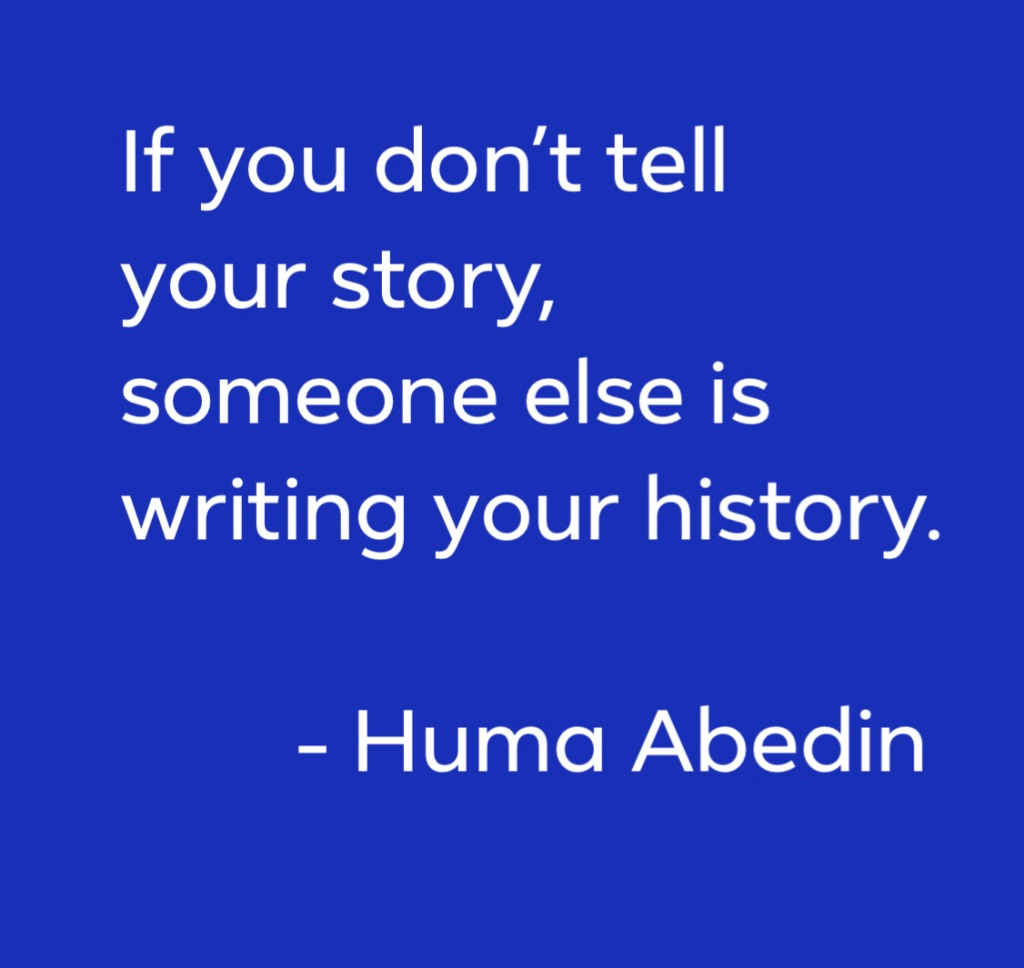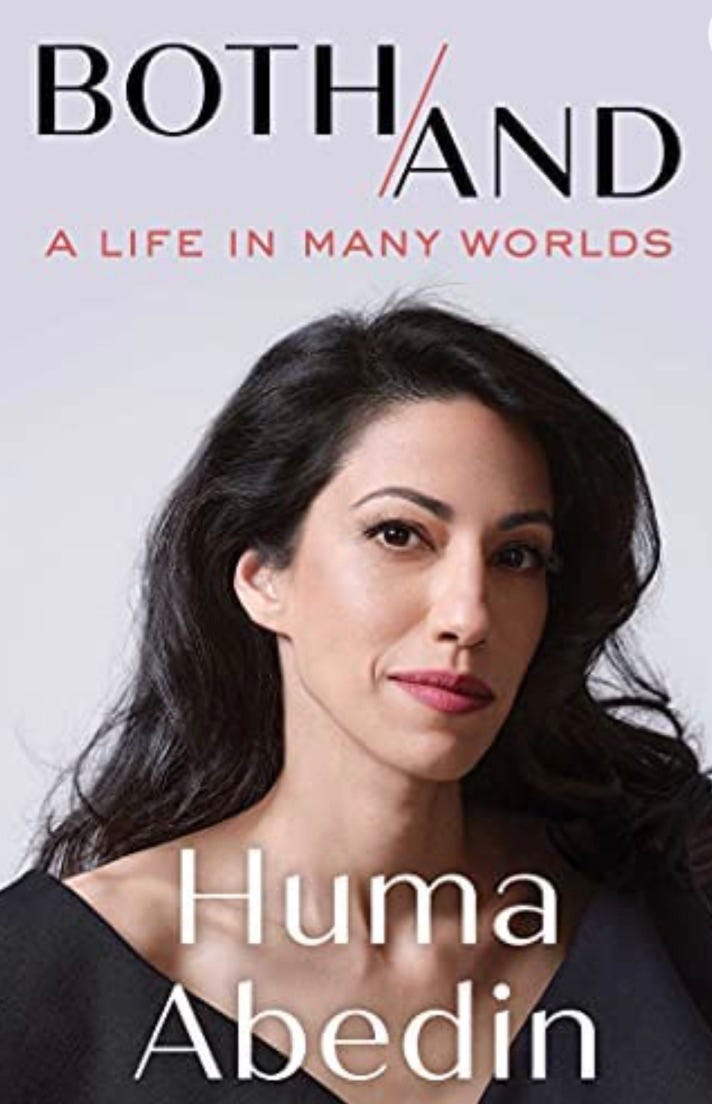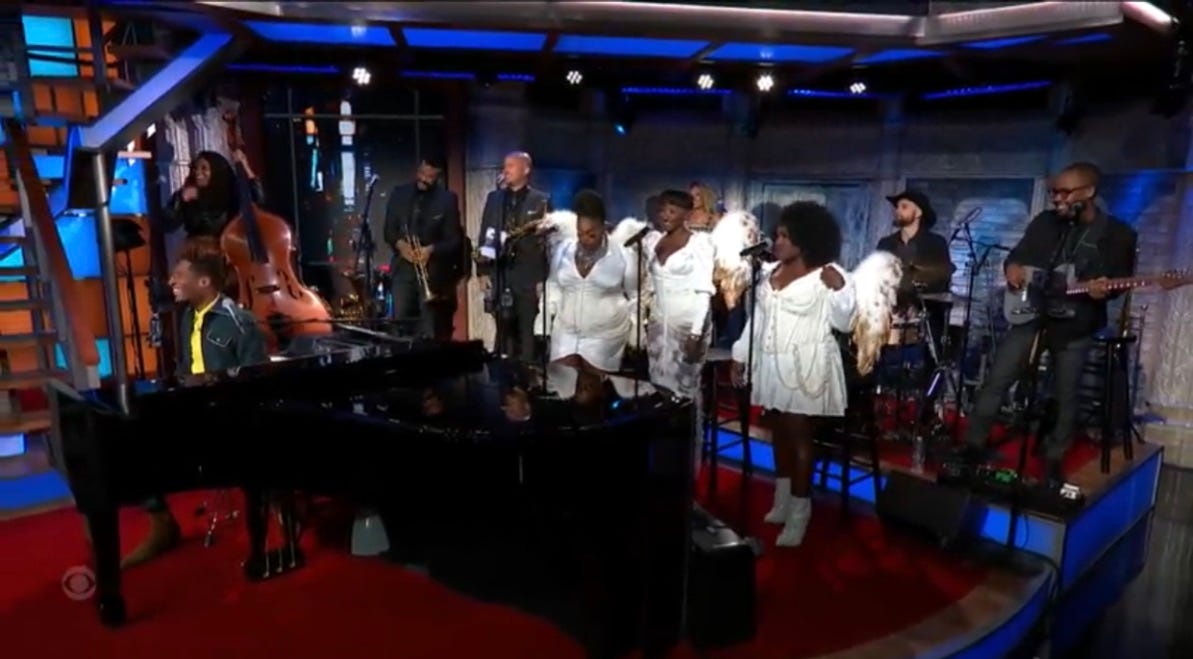News Notebook Friday 11.5.21
Bullfrog Cuisine, Our Bodies/Our Psyche... and Bands Full of Angels?
Happy Friday, and weekend greetings from newShrink!
This news week presents a lot to swallow and digest — some servings more palatable than others — as illustrated by even a sampling of headlines, quotes and drab various visuals.
At writing-time I had just consumed perhaps one too many gulps of hyperbole, hand-wringing headlines and purple-prose pontificating even by seasoned journalists who know better. Into my head comes the voice of colorful, talented veteran-journalist and former colleague Ken Allen, who left this world and all of us too soon. His pithy chosen admonition for me about now would likely be this favorite:
“When you know you have to eat a bullfrog, it’s best not to look at him too long.”
In that spirit, I’d wrestled first with and finished the Virginia governor’s race and other Tuesday election results — and the currently frenzied aftermath — along with the headline overview of collected other key news stories and developments.
The second section today was then to shift focus and feature more directly — and colorfully — on the newShrink themes of psychological and soul dimensions.
But that made the entire top half or more of today’s newShrink so dreary and gray that even I didn’t care to read it!
So with a late-process flip, the psychology and soul-oriented feature section now appears first here, with the election-news piece toward the bottom. (And all of the other news story headlines and links are in the News Haul.)
Note: To open a link to any/all footnoted article(s) of those cited here — plus headlines and links to additional stories and issues — you can click or browse to open today’s Weekly News Haul on the website and go to the article’s corresponding number. The Weekly News Haul also has news items for possible future discussions. (From a browser go to newshrink.substack.com.)
🦋💙
our bodies/our psyche
Here we spotlight three very different featured stories and public figures: A courageous first-ever “inside-out” telling of a private life-story long publicly usurped; a vital, fresh and psychologically savvy new how-to on “the sex-ed talks (starting with us adults); and a CBS news piece that includes depth-psychology approaches for dealing with anxiety, trauma and nightmares.
Here are some shared common threads you might look for that connect these three and illustrate some key depth-psychology concepts:
the ever-present (unconscious) shadow,
the authentic “inside-out”/soul- or “eulogy-” version of our own life-story, and
the embodied psyche — including but not limited to our sexuality.
For time and space considerations I’ll present here mainly content and key quotes from the three different stories, with just a bit of my perspective. Later newShrinks will return to flesh-out many psychological dimensions.
🦋💙
I’ll open this first segment with what may be the latest depth-psychology quote I might like to see someone wearing on a tee shirt:
The news peg here is the debut — including first-ever TV news interviews and a late-night talk show visit — of a new memoir by Huma (pronounced “HUM-ma”) Abedin, a 25-year top aide to Hillary Clinton.
Abedin’s now-ex husband, ex-con and co-parent Anthony Weiner was a rising-star U.S. Congressman, then NYC mayoral candidate whose long-term secret sexting compulsion — including his engaging underage girls — blew up his political career, marriage, reputation and got him some active time in prison. The 2016 election’s October-surprise scandal without question contributed to Clinton’s ultimate narrow electoral-college loss to Donald Trump despite her substantial popular-vote advantage.
In shattering Abedin’s long-held privacy, she says the unsought public exposure and excruciating long, deep healing process has ultimately motivated and empowered her to claim her own story — her history — by telling it for the first time, herself.
(1) Susan Dominus, who has worked on high-profile coverage of various sex and harassment scandals for The New York Times, reviews the memoir Both/And: “Huma Abedin Has Been to Hell and Back. Now She’s Gingerly Telling the Tale.” Here are some excerpts:
“Both/And may not be the most introspective memoir, but it gives readers a front-row view of heartache and humiliation…
When Huma Abedin was a young, single aide to Hillary Clinton, she was already a subject of great fascination… Abedin was known to be private, savvy and stunning — all of which contributed to the firestorm that ensued when the man she eventually married, then-Congressman Anthony Weiner, self-immolated via serial sext…
The original set of questions about Huma was replaced with another: Why would someone like her marry someone like him? Why did she hang on as long as she did? And how did she remain standing through all of it?
In her new memoir, Both/And, Abedin attempts to answer some of these questions... One senses at times that when she falters, she lacks insight rather than sincerity, which is itself a kind of honest answer: Abedin may be one of the most politically astute and well-traveled women in the world, but… far from worldly, at least in affairs of the heart…”
Dominus provides excellent overview that fills in the picture of the highly educated, world-citizen childhood and continued dimensions of Abedin’s life as a Muslim in the “many worlds” of the memoir’s Both/And title.
Choosing at last to write her own story has also brought first-ever TV news interviews — including a late-night talk show debut. Included are (2) CBS News Sunday Morning interview and (3) The Late Show with Stephen Colbert (with very similar content). All are browsable on You Tube as well as in the weekly News Haul.
I’ve watched and listened to several of the full interviews over the past week with the obviously intelligent, thoughtful, poised and sensitive Abedin. During her CBS News Sunday Morning interview, I had what therapists recognize as a somatic (in-the-body) response I’ll just mention here — with more discussion likely in future editions.
Describing how she and Weiner were beginning to discuss marriage seriously, during a dating period she’d found rather dizzying and whirlwind (at age 30), Abedin calmly recounts her future husband’s saying:
“I am broken, and I want you to fix me.”
In the moment last Sunday, never mind Halloween-horror: This had me riveted, goosebumps and hair standing up on the back of the neck. There was a visceral urge to yell, “get OUT!” like the lead character in the so-named Jordan Peele darkly comic/racist-horror film. With a bit of lingering vertigo on this nearly a week later, I welcome some reflection before revisiting with more comments.
Meanwhile, my song-lyric ear-worm alert system started to kick in:
This week, again with James Taylor and his “Country Road” (that had kept intruding on John Denver’s last week!)
(And while I love J.T. and his childhood and family roots were the stuff of Olympian myth in my undergrad years at UNC-Chapel Hill, the meaning of some of his lyrics can be less than intuitively clear or catchy for recall.)
The one that kept grabbing me this time — completely inexplicably — was this line I had to look up: “I can hear a heavenly band full of angels, and they’re coming to set me free…” (????)
At the same time researching further and working on the Huma Abedin piece, I recalled an Elizabeth Banks interview I’d saved from the week before, that in the back of my mind seemed somehow helpful or related.
Opening and revisiting the Banks interview, I see her first moment on-stage and screen is a musical greeting and her exclaimed response to… a band full of angels.
Of course it is!
The effervescent comedic actor-director with a definite grasp of the sustainable and soulful, Banks talks about her podcast, “My Body/My Podcast” (available only in Audible) a bit of a nostalgic nod to the boomer-era classic book, Our Bodies, Ourselves.
I highly recommend a leisurely viewing of the entire video (even, or perhaps especially, if some of the easy, open words and language feel uncomfortable.) Here are some of her comments I find psychologically relevant and that continue to move me:
“It’s a sex-ed podcast, continuing-ed for me about sex, sexuality, and all the questions that I still have as an adult — and all the answers I felt I needed as a parent of two sons who are about to go through puberty. And I’m unprepared…”
(More on her rationale for “naming and de-shaming” of things like body parts, and particularly those involved with women’s sexuality besides just reproduction):
“The more we can open up these conversations, the healthier, more intimate… my hope is, the more deep interactions my sons are going to have with other human beings.”
(On the increased risk of not talking about sex, in an age and culture where pornography is immensely accessible:)
“It’s how our young people… if you leave sex-ed up to the young people, if you don’t talk about these things, porn is their number-one teacher. And I just felt like, I’d rather they hear stuff from me, and that they have a real literacy around it. Because pornography is not reality.”
(And with Colbert, Banks doesn’t mince words about the tremendous need for men to be more engaged emotionally, conversationally, and relationally with their partners and all the women in their lives — rather than delegating by default so much of open conversation and conscious-sexuality to women. Combining her signature humor with the salient point, she drew a big laugh with applause for this summary of it:
“I tell you what, if he’s not willing to buy tampons for you, kick him out of bed!”
As I’ve continued to reflect on both the Elizabeth Banks sexuality-interview and its juxtaposition with Huma Abedin’s appearances and story — especially with the well-timed and welcome re-appearance of that musical “band full of angels” — I continue to be haunted. I’m pondering so many aspects of Banks’ approach alongside so much that has been heartbreaking and tragic in the lives and stories of both Huma Abedin and Anthony Weiner. Some of these emerging thoughts will be appearing in later comments, I’m sure.
(4) You can click here to the the Elizabeth Banks Late Show interview with Stephen Colbert, and it is also browsable on You Tube.
(5) There’s also a print review of the Elizabeth Banks podcast from The Boston Globe in her home state of Massachusetts.
🦋💙
Completing the feature-trio is “Why Nightmares Might Actually Be a Good Thing,” (6) a CBS News Sunday Morning piece connecting imagery from nightmares, dreams, dealing-with our fears, and the treatment of anxiety. The very different experts agree on one thing: Dreams, even nightmares, are good — even healing and healthy. Here are quotes that reflect the broad spectrum.
"If I have a nightmare, I'm so excited," said Hollywood horror film director and creator of “History of Horror,” Eli Roth. "The first thing I wanna do is write it down, 'cause it's like this gold mine of imagery that you'd never get otherwise. None of us like having nightmares, but they're actually very healthy to have, because you're acknowledging something you're afraid of, and you're letting out and expressing it. I just take my nightmares a step further, and then I write it down and I film it and I project it onto everybody else!"
Meanwhile, PhD Jon Abramowitz, the clinical psychologist, professor and director of the UNC-Chapel Hill Anxiety & Stress Research Lab and Clinic, tends to minimize the unconscious and individual-specific language of symbols served up by our dreams. Yet he also says we tame our worst fears (in nightmares or in real life) by confronting them — and demonstrates exposure-therapy helping a patient overcome a very specific individual fear of spiders. (Science and data are hugely valuable. But their own highly individual images and felt-body experiences — not repeatable statistical generalities — are what move patients to seek help in the first place, and are the only map we clinicians have to what is going on with them!) Abramowitz does say that:
“Effective treatment involves having the person recount the nightmares, writing them out engaging with them in a healthy way, rather than trying to push them away. Lots of research suggests that when we try to push away our private experiences — thoughts, emotions — that just makes them worse, because then we become preoccupied with trying to push them away. And those experiences end up just kind of pushing us around, bossing us around more than they need to."
Some experts say there's really no such thing as a bad dream. Which brings me to the third, and most grounded in depth/soul-focused psychology, of the three: Clinical Psychologist and 20-year licensed Canadian psychotherapist Leslie Ellis. Her PhD is from the Chicago School of Professional Psychology; her MA in Counseling Psychology was from my graduate school alma mater, Pacifica Graduate Institute (before my time, so I don’t know her.)
I value Ellis’ work particularly for its strong emphasis on working with our felt-sense of the body in all her work. She taps both a simple, body-based check-in process called Focusing (created by Eugene Gendlin) and Jung’s active-imagination process. To Ellis:
"Yes, I believe that all dreams are trying to help us sort through our emotional lives. Sometimes they represent physical illness that, you know, the dreaming sort of picks up on early warning signs."
🦋💙
Now a shift in tone and focus…
about that election news…
On the Tuesday Virginia, New Jersey and other races
Coverage pretty much across the political spectrum since Tuesday’s elections demonstrates how even the most skilled, disciplined and professional journalists — and revered journalism organizations — can sometimes just completely freak out. Thankfully it’s usually temporary.
To drill-down in The New York Times main first-day story: (7) The early headline,“Democratic Panic Rises as Virginia Loss Exposes the Party’s Weakness,” was shared via Twitter by Melanie Sill, along with her spot-on facetious observation that “This is a ‘news’ story, by the way….”
The initial, “panicky” headline must have drawn other negative attention, for later updates of the Times amended it slightly to: “Rough Night for Democrats Exposes the Party’s Weakness.” (However, the breathless hyperbole continues in this introductory thumbnail above the story:)
“Less than a year after taking power in Washington, the party faces a grim immediate future, struggling to energize voters without a presidential foil and losing messaging wars to Republicans.”
Then there’s this lede… on the “news” pages of the stodgy-venerable “Gray Lady” NYT, herself?
“The menacing thunder couldn’t get much louder for Democrats.”
(A bit more on Melanie Sill, a veteran journalist whose work and commentary I respect and recommend for its focus not only on the what but how journalism is practiced. You can find her on Twitter @melaniesill. The former top editor and news executive of The News and Observer of Raleigh, Sacramento Bee and Southern California Public Radio/KPCC, most recently Sill led the 2020 launch and first year of the new Local News Workshop at Elon University School of Communications and co-founded the NC Open Government Coalition. She edited the News and Observer of Raleigh’s 1996 Public Service Pulitzer Prize-winning “Boss Hog” investigative series on environmental and other impacts of NC hog industry waste systems.)
For a contrasting take on this week’s elections that at least opens more reflective consideration in days ahead: (8) “Biden and Trump Both Lost This Week” from Susan Glasser in The New Yorker. Here’s an excerpt of lede paragraphs.
“It was all Joe Biden’s fault. It was all Donald Trump’s fault. The Democratic Party has gone too far left—or not far enough. Republicans won because of the culture wars and the racist dog whistles. Republicans won because Biden failed to deliver. Republicans won because Congress failed to deliver. Voters were mad about inflation and covid and mask mandates and school closures. Terry McAuliffe screwed up by mentioning Trump. Glenn Youngkin was a genius for not being Trump.
Ah, the blame game. There’s nothing else quite like this particular political ritual when, once every four years, Virginia and New Jersey hold the first major statewide contests following the Presidential election a year earlier—and everyone sifts through the results for important national implications, which may or may not exist. A year from now, will we still be debating the bogeyman of “critical race theory” that some Republicans have decided is the ticket to taking control of Congress? Who knows? But such is today’s news cycle. Youngkin ran with it; maybe it will work everywhere.”
If you find yourself ready to delve faster and farther into aftermath and take-aways from this week’s Virginia and other elections, I recommend:
(9) The NPR “All Things Considered” interview with veteran political journalist Mara Liasson with Kelsey Snell, “What Happened in Last Night’s Elections — and What it Means for Democrats,” Wednesday, 11.3.21.
(10) Lawyer-activist Robert Hubbell’s Today’s Edition, especially Thursday 11.4.21, “It’s Hard to Beat Someone Who Won’t Give Up.” (Browse to roberthubbell.substack.com.)
And as usual, (11) Heather Cox Richardson offers calming historic perspectives in this week’s Letters From An American. (Browse to heathercoxrichardson.substack.com.)
a decent-interval Rx?
The remainder of The Notebook’s headline-overview of other stories is in the News Haul. That’s partly for space considerations and for balance with newShrink’s focus on psychological and soul dimensions. It’s also because, for the moment, these early-cycle off-year elections are sucking so much energy and oxygen across the national news-scape. It’s tempting to suggest — as some of us might occasionally beg of the kids in our lives — that we all “just go color” for a few days… or weeks! Or to say it more like grown-ups, how about a “decent interval” before attempting dissection.
For servers and consumers of news alike, the current election news environment is a vivid example of recent newShrink discussions about how our thinking brains, bodies and nervous systems function — and fail to function — in conditions of high emotional arousal (or the adrenaline rush of immediacy and novelty that are characteristic of breaking news cycles). In such conditions we are operating not out of conscious or cognitive choice, but in unconscious reactivity that has us in a high-alert state of readiness either to fight, to flee… or to freeze. (With the third of these both very common and most often unknown, misunderstood or overlooked.)
These bodies and psyche we live in can help inform us in ways that are pretty amazing, when we let them.
Reminder: For headlines and links to other stories and issues, you can go to today’s Weekly News Haul on the website.
Today I leave you with this Halloween-night update from the inspiration for last week’s "young witch accessorizing with different brooms” image. A dear — and one of my most physically gorgeous friends all other days of the year — this PA reader and her entire book club have a passionate interest and long-established seasonal tradition honoring all things positively bewitching.
And, that is all I have! Talk to you next week.
🦋💙tish
… it is important that awake people be awake,
or a breaking line may discourage them back to sleep;
the signals we give — yes or no, or maybe —
should be clear: the darkness around us is deep.
— William Stafford, “A Ritual to Read to Each Other”









